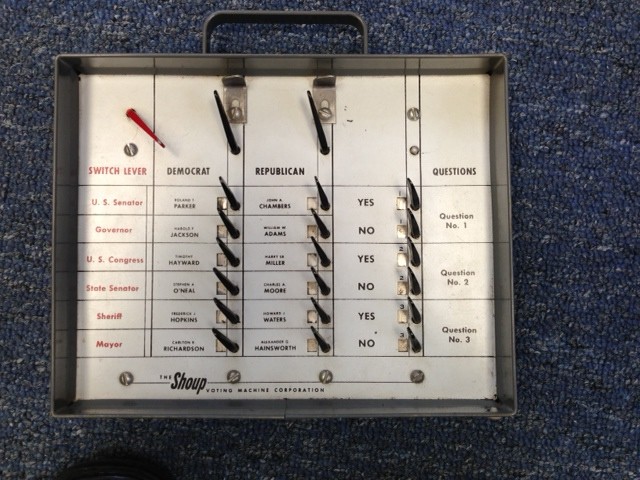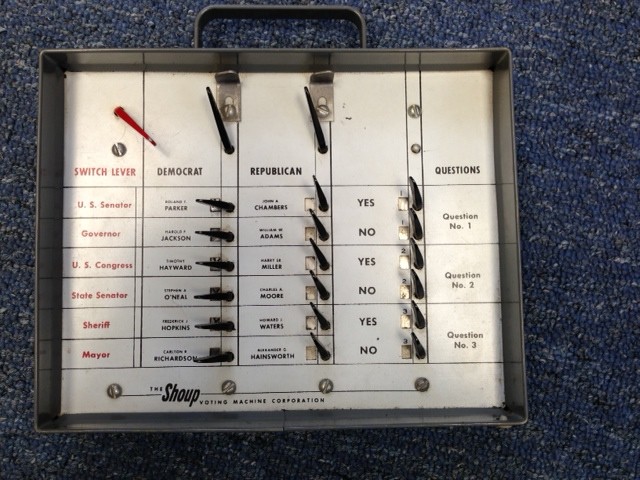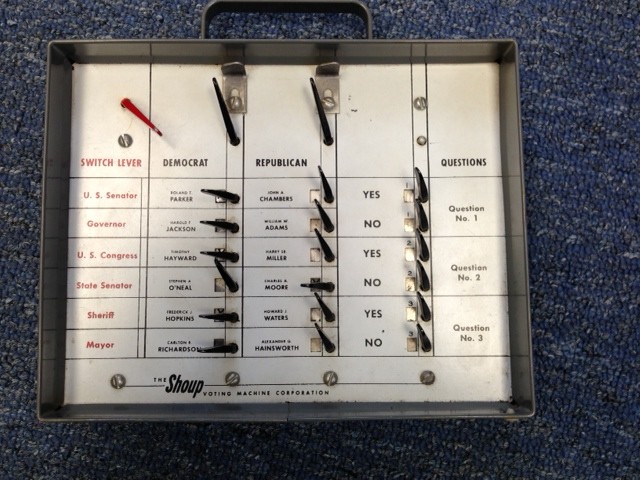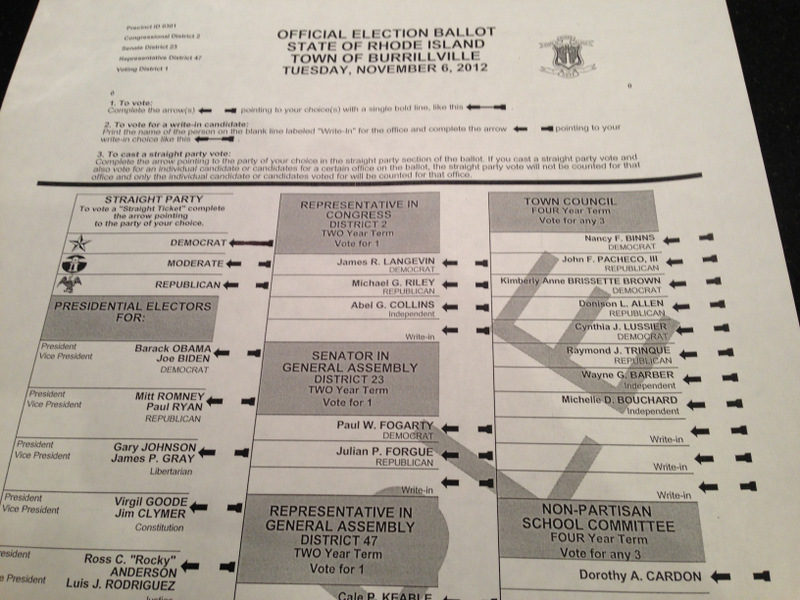Bob Plain has spent a lot of time in a back and forth with Ken Block about the issue of eliminating the straight-party option (a.k.a. master lever), even bringing in Speaker Gordon Fox to defend its place on the ballot. I’d like to move the debate away from questions of political motivation and toward some facts. My argument is simple; the straight-party option discriminates against the elderly, African-Americans, those with less-education, and those with less experience using technology.
Voting is the interaction of four factors; the voter, the ballot, the machine used to tabulate the results, and the institutions governing the election. Typically studies about how voters behave have to rely on aggregate level data because of the secret ballot. As I will show later we now have micro-level information about voter behavior that will demonstrate problems with the straight-party option, particularly for some groups of voters.
In Rhode Island state law dictates that a paper ballot be used and the names of candidates be arranged by office [referred to in the literature as an office bloc ballot compared to the older party-column design]. Paper ballots are the only way to produce a truly verifiable trail for recounts (though Carlos Tobon can attest other changes in state law are needed to ensure that) and RI shouldn’t consider moving away from their use. There is no better system for verifying the results than the use of paper.
State law also requires use of an optical scanner to tabulate the results. While there are advantages to touch screen voting, particularly for accessibility, optical scanners with the requisite paper ballots are much better than black box touch screen systems. Optical scanners are by no means infallible, just read this scary report from the Brennan Center to see why we need to start auditing the results of our scanners.
The final pieces of the puzzle are our institutional structures. Typically in a Rhode Island election you have a number of different offices (federal, state, local) and ballot questions (state and local) that are a result of the many institutions that govern us. This too plays into why the straight party option is harmful.
Straight-party voting becomes a problem because of the interaction of those four factors. Optical scanners, for all their positive properties, cannot tell the voter that they have made an inadvertent error on the ballot. One of the few redeeming qualities of the old mechanical voting machines (sometimes referred to as the lever machines) was that when you pulled the actual “master lever” the only way you could bullet vote was to physically undo your vote for an office and then bullet vote (see pictures) and if you undervoted for it was literally staring you in the face.



Compare the old machine to the current paper ballot (see pictures below). With the new ballots and scanners if you chose the straight party option nothing on the ballot will tell you what choices you made (or did not make) further down the ballot. And if you make a change, the ballot does not indicate what impact that might have on other parts of the ballot.



Of course because of the secret ballot we cannot know what the voter was really thinking when they used the straight party option and whether what we perceive to be undervotes and errors are intentional.
Fortunately, social science comes to the rescue. Several political scientists conducted an extensive experiment funded by the National Science Foundation (funding attacked recently in an amendment born out of the ignorance of Senator Tom Coburn) using the same type of ballot and brand of scanner (albeit a newer model) that we have here in Rhode Island.[1] Because their work was experimental, they could interview voters and examine their ballots to determine if the voters’ expressed preference were captured in the tabulation and thus avoid the ecological inference problem. And because they were using an experimental design they used a diverse set of participants and could test for how the interaction of ballot [similar in design to Rhode Island], machine [same brand, newer model than Rhode Island], institutions, and humans worked.
The best way to present the results is to quote directly from the authors:
Our research demonstrates that ballot design matters. It influences the number of errors of commission—that is selecting an unintended candidate—and omission—so-called undervoting. Voters who use standard office bloc ballots make fewer candidate-selection errors than those who use ballots with a straight-party option. These are the most serious type of error because not only do they deprive a candidate of a vote, they also give it to one of the candidate’s opponents. Wrong candidate errors also occur with substantial frequency—as the 2000 presidential election showed. Ballot style does not have a uniform effect on all voters. Older, less educated, and Black voters, are more likely to commit wrong candidate errors when using a ballot with a straight-party feature than a standard office bloc ballot. The same is true of voters who are using a specific voting system for the first time.[2]
Put into plain English, the researchers found that when using paper ballots with optical scanners and an office block ballot design, older, less-educated, African-Americans and those with less exposure to the optical scan voting machine all had more problems casting the correct vote when the straight-party option was available. It’s not that they undervoted (failed to cast a vote down ballot), but they actually voted for a candidate other than the one they intended to vote for. There were instances where the presence of the straight-party option led to undervotes, but that problem was minimized by the optical scan system, and dwarfed by the problem of actual errors being committed by the voters.
In Speaker Fox’s interview with Bob Plain he says, “you have to presume that they [voters] know what they are doing and that they are using the master lever.” We believe that the analysis we highlight here shows that, unfortunately, many voters do not. The mix of voters, ballot design, machine type and institutions we currently have just doesn’t work.
Hopefully providing this analysis allows us to move past the arguments about political motivation for removing the straight-party option. Quite simply, its presence does a disservice to a significant number of voters by preventing them from having their true preferences recorded as a cast vote. The bill to remove the straight party option has been “held for further study” once again this year. We have provided all the “study” that is needed to prove that it’s time for it to go.
[1] Paul S. Herrnson, Michael J. Hanmer, Richard G. Niemi, The Impact of Ballot Type and Voting Systems on Voting Errors, April 2008, accessed at http://www.bsos.umd.edu/gvpt/apworkshop/herrnson-hanmer08.pdf.
[2] Ibid, pp. 20-21.







